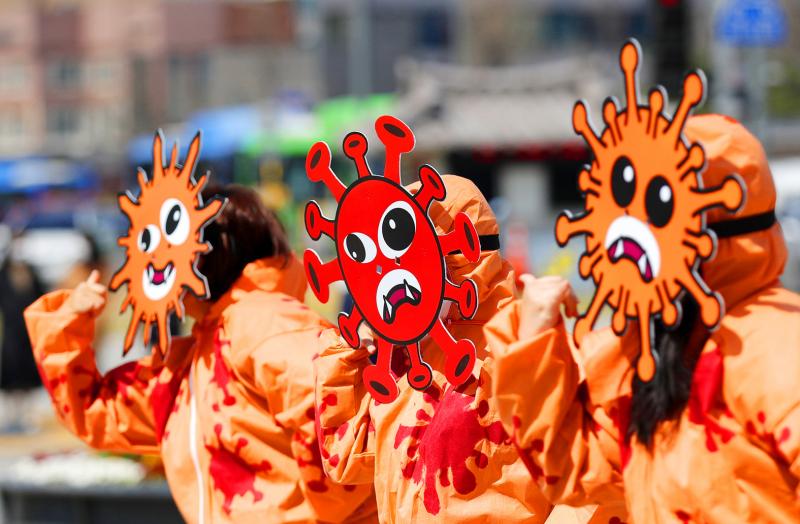A South Korean tabletop exercise on emergency responses to a fictional mysterious outbreak led directly to tools the country deployed less than a month later to manage the arrival and spread of COVID-19, one of the experts involved said.
According to an undisclosed government document seen by reporters, on Dec. 17 last year, two dozen leading South Korean infectious disease specialists tackled a worrying scenario: A South Korean family contracts pneumonia after a trip to China, where cases of an unidentified disease had arisen. The hypothetical disease quickly spreads among the colleagues of the family members and medical workers who treated them.
In response, the team of experts at the Korea Centers for Disease Control and Prevention (KCDC) developed an algorithm to find the pathogen and its origin, as well as testing techniques.

Photo: AP
Those measures were mobilized in real life when a first suspected coronavirus patient appeared in South Korea on Jan. 20, the document said.
“Looking back over the past 20 years, humans were most tormented by either influenza or coronaviruses, and we’re relatively doing well on influenza but had been worried about the possibility of the outbreak of a novel coronavirus,” said Lee Sang-won, one of the KCDC experts who led the drill.
“It was blind luck — we were speechless to see the scenario become reality, but the exercise helped us save much time developing testing methodology and identifying cases,” Lee said.
The exercise played a key role in slowing what became Asia’s largest coronavirus epidemic outside China using aggressive and sustained testing.
After a big early outbreak, South Korea rolled out widespread testing within days, launching an extensive program to test people who do not have symptoms but might be able to infect others, isolate confirmed patients and trace their contacts.
The country won praise for containing the spread of the disease with comparatively little disruption. It has reported 9,583 cases and 158 deaths, and managed to bring the daily tally of new infections to about 100 or fewer for the past three weeks.
The KCDC team, which Lee said was formed in 2018 as a sort of study group, had wanted to boost large-scale DNA analysis capabilities after the organization was criticized for its handling of a 2015 outbreak of Middle East Respiratory Syndrome.
Soon after the drill, the coronavirus epidemic emerged in the Chinese city of Wuhan, prompting the experts to begin considering that it might be a novel coronavirus.
Even before Beijing officially declared it, the South Korean team was ready to begin testing, Lee said.
The document also showed that the KCDC established testing methodology on Jan. 4, three days before Chinese authorities identified the virus, and started testing suspected cases on Jan. 9.
Early this month, South Korea was capable of running as many as 20,000 tests a day, with five firms churning out kits for domestic use and export.

DOUBLE-MURDER CASE: The officer told the dispatcher he would check the locations of the callers, but instead headed to a pizzeria, remaining there for about an hour A New Jersey officer has been charged with misconduct after prosecutors said he did not quickly respond to and properly investigate reports of a shooting that turned out to be a double murder, instead allegedly stopping at an ATM and pizzeria. Franklin Township Police Sergeant Kevin Bollaro was the on-duty officer on the evening of Aug. 1, when police received 911 calls reporting gunshots and screaming in Pittstown, about 96km from Manhattan in central New Jersey, Hunterdon County Prosecutor Renee Robeson’s office said. However, rather than responding immediately, prosecutors said GPS data and surveillance video showed Bollaro drove about 3km

Tens of thousands of people on Saturday took to the streets of Spain’s eastern city of Valencia to mark the first anniversary of floods that killed 229 people and to denounce the handling of the disaster. Demonstrators, many carrying photos of the victims, called on regional government head Carlos Mazon to resign over what they said was the slow response to one of Europe’s deadliest natural disasters in decades. “People are still really angry,” said Rosa Cerros, a 42-year-old government worker who took part with her husband and two young daughters. “Why weren’t people evacuated? Its incomprehensible,” she said. Mazon’s

‘MOTHER’ OF THAILAND: In her glamorous heyday in the 1960s, former Thai queen Sirikit mingled with US presidents and superstars such as Elvis Presley The year-long funeral ceremony of former Thai queen Sirikit started yesterday, with grieving royalists set to salute the procession bringing her body to lie in state at Bangkok’s Grand Palace. Members of the royal family are venerated in Thailand, treated by many as semi-divine figures, and lavished with glowing media coverage and gold-adorned portraits hanging in public spaces and private homes nationwide. Sirikit, the mother of Thai King Vajiralongkorn and widow of the nation’s longest-reigning monarch, died late on Friday at the age of 93. Black-and-white tributes to the royal matriarch are being beamed onto towering digital advertizing billboards, on

POWER ABUSE WORRY: Some people warned that the broad language of the treaty could lead to overreach by authorities and enable the repression of government critics Countries signed their first UN treaty targeting cybercrime in Hanoi yesterday, despite opposition from an unlikely band of tech companies and rights groups warning of expanded state surveillance. The new global legal framework aims to bolster international cooperation to fight digital crimes, from child pornography to transnational cyberscams and money laundering. More than 60 countries signed the declaration, which means it would go into force once ratified by those states. UN Secretary-General Antonio Guterres described the signing as an “important milestone,” and that it was “only the beginning.” “Every day, sophisticated scams destroy families, steal migrants and drain billions of dollars from our economy...